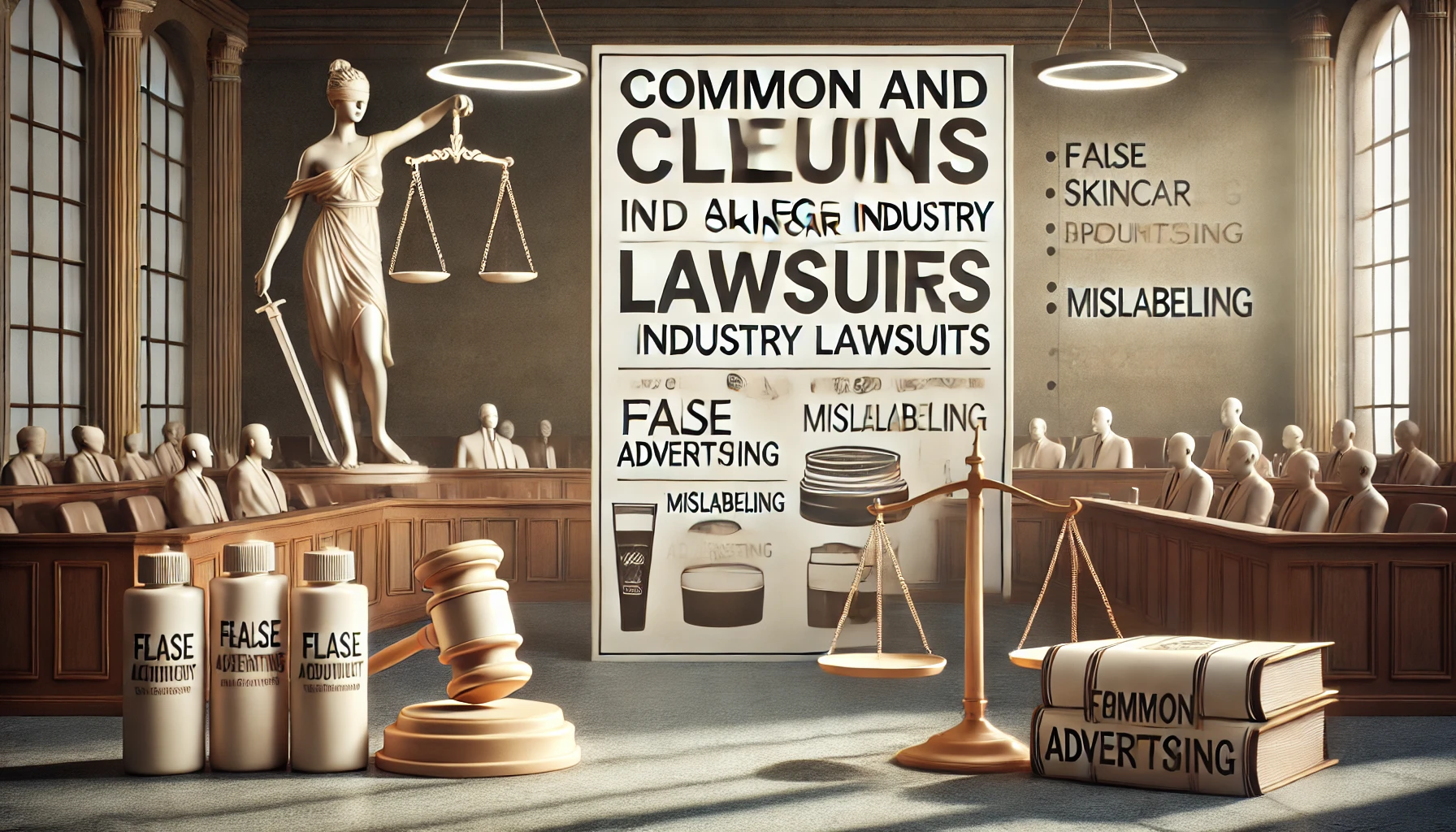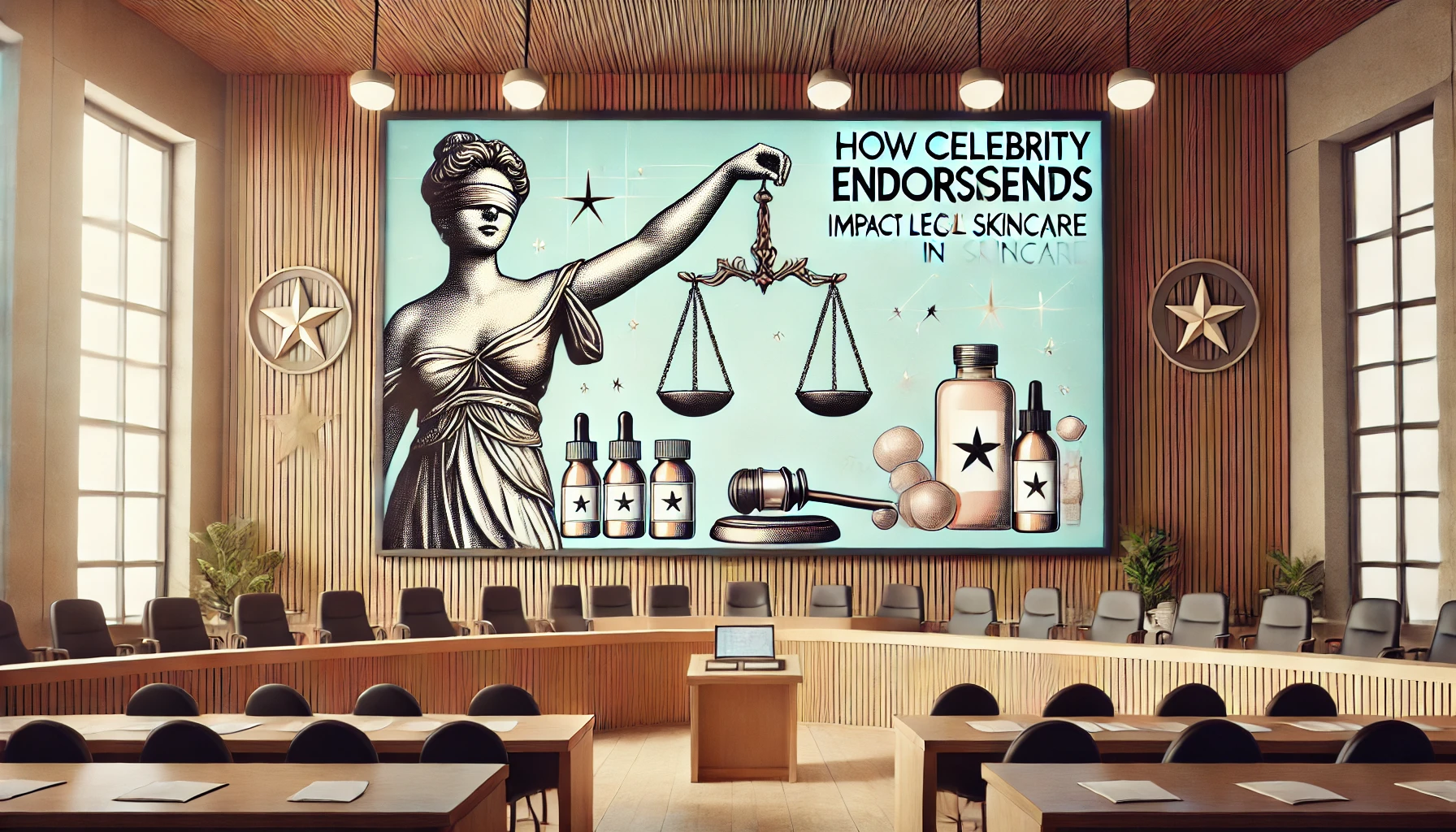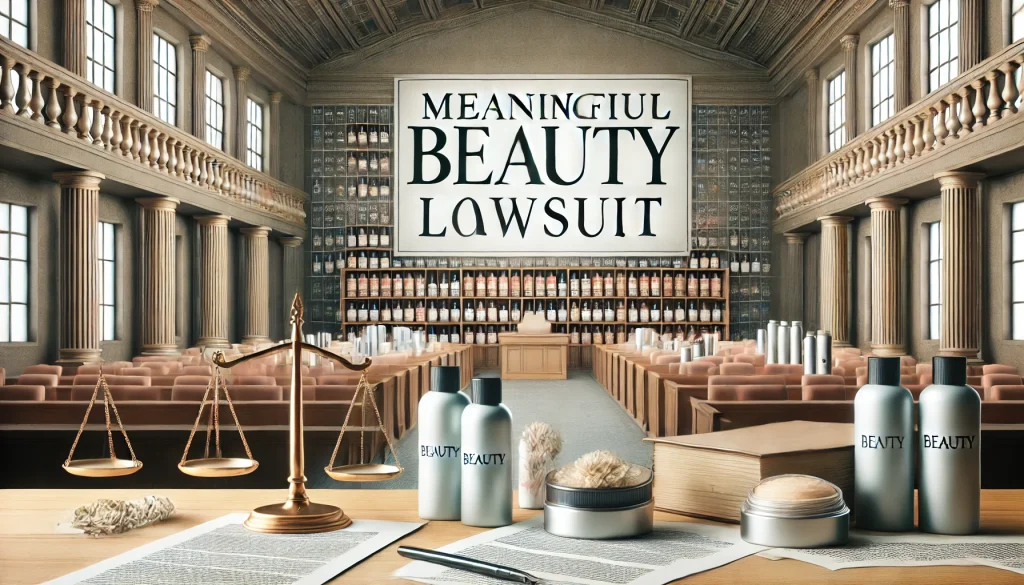The Meaningful Beauty lawsuit has attracted significant attention as consumers and industry experts scrutinize the legal claims surrounding the popular skincare brand. This case highlights potential issues within the beauty industry, specifically related to transparency, product efficacy, and consumer safety standards. Understanding the specifics of this lawsuit can provide insight into broader trends affecting cosmetics and skincare products on the market today.
The lawsuit raises essential questions about Meaningful Beauty’s product claims and the marketing strategies employed to attract consumers. Allegations center on whether certain promises regarding product effectiveness are misleading, bringing attention to the role of advertising in shaping consumer expectations. This case underscores the need for accuracy and reliability in promotional practices, especially within the beauty industry.
As the Meaningful Beauty lawsuit unfolds, the legal landscape for cosmetic companies may face changes, especially if the case results in stricter regulations. For consumers, the lawsuit serves as a reminder of the importance of being well-informed about skincare products and their ingredients, while for companies, it emphasizes the necessity of compliance with industry standards and transparency.
Meaningful Beauty Lawsuit: What Sparked the Legal Dispute?
The Meaningful Beauty lawsuit emerged due to customer complaints and concerns about product claims that some allege were misleading. Consumers reported that the results promised in marketing campaigns did not align with their personal experiences, leading to dissatisfaction and a closer examination of the brand’s claims.
The dispute primarily revolves around the effectiveness and safety of the ingredients in Meaningful Beauty products. Customers questioned whether the products could genuinely deliver on the advertised promises, such as visibly reducing aging signs, which added weight to the legal complaints. This is common in the beauty industry, where companies face pressure to substantiate their claims with scientific evidence.
In response to the lawsuit, Meaningful Beauty’s parent company is expected to provide data backing up their product claims. This documentation will likely include clinical test results or studies showing the efficacy and safety of the products. If the company cannot provide substantial evidence, it may impact not only their case but also the wider industry standards.
A potential outcome of the lawsuit may include a settlement or reformation in marketing practices, depending on the evidence presented. The case serves as a critical example for other brands, underscoring the importance of transparency and accountability in advertising practices within the skincare market.
The Financial Implications of Skincare Product Lawsuits

Skincare product lawsuits can have substantial financial implications for companies, including direct legal costs, settlements, and lost revenue due to reputational damage. Legal fees alone can cost brands millions, particularly if the case involves extensive investigations, expert testimonies, and prolonged court proceedings. Settlements, which are common in these cases, also add to the financial burden, and the size of settlements can vary widely based on the severity of the claims.
Beyond direct costs, lawsuits can lead to a drop in sales as consumers lose trust in the brand. Negative publicity often spreads quickly, affecting not only the company being sued but also other brands within the same parent company. In some cases, companies may need to invest in costly rebranding campaigns to rebuild their image, adding to the financial toll of lawsuits.
Insurance premiums for beauty companies can also increase as a result of legal disputes. Many brands hold product liability insurance to cover claims of harm, but repeated lawsuits can lead to higher premiums. This long-term impact on financial stability makes it crucial for brands to prioritize safety and compliance.
| Financial Impact | Description |
| Legal Fees | Costs associated with defending the lawsuit |
| Settlements | Payments to resolve claims |
| Loss of Sales | Decline in revenue from negative publicity |
| Increased Insurance Premiums | Higher costs due to repeated claims |
Overall, the financial implications highlight the importance of preventative measures. For skincare brands, ensuring product safety and transparency is not only ethical but also a sound financial strategy to avoid costly litigation.
The Origins of the Meaningful Beauty Brand and Its Legal Challenges
Founded by celebrity Cindy Crawford, Meaningful Beauty quickly gained popularity for its anti-aging products that promised significant results. The brand’s identity is closely tied to Crawford’s own youthful image, creating high expectations among consumers. However, this branding has also intensified the scrutiny it faces in the legal sphere, especially when customers feel their expectations haven’t been met.
The brand was originally designed around exclusive formulations involving ingredients like melons sourced from France, said to have unique anti-aging properties. However, the lawsuit questions whether these ingredients are genuinely as unique or effective as advertised, challenging the validity of the claims central to the brand’s identity.
The Meaningful Beauty lawsuit has brought to light some of the difficulties faced by beauty brands that rely heavily on celebrity endorsements. While endorsements create trust and appeal, they also risk elevating customer expectations to levels that are difficult to meet consistently. This is especially relevant in legal challenges, where unsubstantiated claims can lead to costly consequences.
As more beauty brands enter the market, they face increasing competition, which can drive companies to make bold claims to stand out. This case may encourage other companies to review their claims and substantiate them with robust evidence to avoid similar legal challenges.
Understanding Consumer Rights in the Meaningful Beauty Lawsuit
The Meaningful Beauty lawsuit highlights important aspects of consumer rights, especially regarding informed consent and protection against deceptive marketing practices. Consumers have a right to expect that product claims are accurate and that ingredients are safe and effective as promoted.
Consumer protection laws typically require companies to provide clear and truthful information. When brands fail to uphold these standards, consumers may have grounds to file complaints or seek compensation. In the case of Meaningful Beauty, the lawsuit alleges that customers were misled by marketing that promised unrealistic outcomes.
| Key Consumer Rights in Product Claims | Description |
| Right to Information | Brands must provide accurate information. |
| Right to Safety | Products should be safe for regular use. |
| Right to Be Heard | Consumers can voice complaints or disputes. |
| Right to Refund/Compensation | Refunds are expected when claims are false. |
This lawsuit underscores the importance of consumers understanding their rights, as many individuals may not be fully aware of protections available to them. It also highlights the role of regulatory agencies in ensuring that beauty brands follow appropriate advertising and product safety guidelines.
By staying informed about their rights, consumers can make more empowered purchasing decisions and hold brands accountable when they fall short of industry standards or ethical practices.
Common Claims and Allegations in Skincare Industry Lawsuits

The Meaningful Beauty lawsuit is part of a broader trend of legal cases in the skincare industry. Common claims often involve false advertising, with brands accused of exaggerating product results or failing to disclose possible side effects. Consumers have the right to be informed about potential outcomes and risks, making transparency essential.
Misrepresentation of ingredients is another frequent issue in the beauty industry. Some brands market their products as containing unique or exotic ingredients, but lawsuits often reveal these claims to be misleading or overstated. For example, if an ingredient is claimed to be rare or scientifically groundbreaking, evidence is required to substantiate this claim in order to avoid legal action.
Many lawsuits also focus on potential health risks associated with certain skincare products. Ingredients like parabens, sulfates, or certain preservatives have been linked to skin irritation or allergic reactions. If a product causes harm to users, legal claims can follow based on inadequate disclosure or a lack of warnings regarding potential side effects.
To mitigate such claims, companies are encouraged to rigorously test their products and disclose all relevant information to consumers. Transparency and adherence to regulatory guidelines are crucial for maintaining consumer trust and avoiding legal challenges. The Meaningful Beauty lawsuit serves as a reminder for brands to align their marketing with ethical standards and clear, accurate messaging.
How the Beauty Industry Is Responding to Product-Related Lawsuits
In light of rising legal challenges, the beauty industry is taking proactive steps to address transparency and safety concerns. Many brands are adopting stricter labeling practices, providing clear ingredient information to meet consumer expectations and reduce the risk of lawsuits.
- Clear Labeling Practices: Brands are now disclosing more information on product labels, covering ingredient sources, purpose, and potential side effects.
- Enhanced Certifications: More brands are obtaining certifications like “dermatologist-tested” or “cruelty-free” to validate their claims and establish credibility.
- Consumer Feedback Channels: By actively listening to consumer feedback, companies can resolve issues early, preventing dissatisfaction and potential legal claims.
As part of their legal strategy, companies are also investing in third-party verification of claims. Certifications help reassure consumers, reduce brand liability, and provide legal defenses against claims. By implementing these proactive strategies, brands can minimize legal exposure and build consumer trust.
The Role of Product Transparency in Beauty Product Litigation
Product transparency is a central issue in beauty product litigation, as consumers increasingly demand clear and truthful information about what goes into their skincare products. Transparency involves not only listing ingredients but also explaining their purpose, sourcing, and potential side effects. Lack of transparency can lead to mistrust and, as seen with the Meaningful Beauty lawsuit, legal disputes that challenge a brand’s reputation.
Brands that prioritize transparency are less likely to face litigation. For example, disclosing the exact nature and source of ingredients can prevent accusations of misleading advertising. Transparent labeling practices give consumers the information needed to make safe, informed choices about the products they use daily.
In many cases, legal action is spurred by discrepancies between advertised claims and actual product performance. For instance, if a product claims to have “unique anti-aging properties” without verifiable data, consumers may file lawsuits citing misrepresentation. This has become a standard in the beauty industry, where exaggerated promises are often met with legal scrutiny.
| Transparency Factor | Consumer Benefit |
| Ingredient Clarity | Informs about possible allergens |
| Purpose Disclosure | Educates on what the product does |
| Source Transparency | Indicates ethical or sustainable sourcing |
| Potential Side Effects | Allows for safer product selection |
When brands commit to transparency, they not only meet regulatory standards but also build trust with their customers, reducing the likelihood of litigation. For beauty companies, being upfront about their ingredients and effects has become both a marketing strategy and a legal safeguard.
How Celebrity Endorsements Impact Legal Cases in Skincare

Celebrity endorsements play a significant role in the success of skincare brands, but they can also intensify the impact of legal cases. For Meaningful Beauty, Cindy Crawford’s endorsement brought significant attention to the brand, creating a high level of trust among consumers. However, endorsements also heighten expectations, which can lead to disappointment and litigation if the product fails to deliver as advertised.
When a celebrity is tied to a brand, the endorsement can be seen as a personal assurance of product quality. In legal cases, this becomes a focal point, as consumers may feel betrayed by both the brand and the celebrity if claims are misleading. Such endorsements are scrutinized for their alignment with the product’s actual benefits, as seen in various skincare lawsuits.
For celebrities, involvement in legal cases linked to the brands they endorse can have reputational consequences. Negative publicity from lawsuits can reflect poorly on the celebrity, affecting their credibility and future endorsement deals. This risk makes it crucial for endorsers to thoroughly vet products and companies before associating their names with them.
In the courtroom, celebrity endorsements can serve as evidence that the brand intended to create high consumer expectations. If the product doesn’t meet these expectations, plaintiffs may argue that the endorsement was deceptive, increasing potential liability for both the brand and the endorser.
Meaningful Beauty Lawsuit: An Overview of the Claims and Defenses
The Meaningful Beauty lawsuit centers on alleged false advertising and unmet consumer expectations. Consumers argue that the products failed to deliver advertised anti-aging benefits, creating grounds for litigation.
- False Advertising Claims: The plaintiffs assert that Meaningful Beauty’s products did not achieve the promised results, particularly in reducing signs of aging.
- Ingredient Efficacy: Consumers question the effectiveness of specific ingredients and whether they are truly as beneficial as advertised.
- “Results May Vary” Defense: The brand may argue that individual results vary, which is common in beauty product defenses, as outcomes depend on skin type and usage patterns.
To support their case, Meaningful Beauty might present clinical trials or studies showing the efficacy of their ingredients. This evidence could help substantiate the brand’s claims and refute allegations of misleading advertising. The case’s outcome could set a precedent in beauty industry litigation, influencing how brands frame and substantiate product claims in the future.
Meaningful Beauty Lawsuit: Key Points Consumers Should Know
The Meaningful Beauty lawsuit has several essential elements that consumers should understand to make informed choices. The lawsuit primarily questions the accuracy of product claims, such as promises of youth-enhancing benefits that consumers argue were unsubstantiated. Consumers should be aware that advertised results might vary widely and are often dependent on individual skin types and usage.
One key point is that false advertising claims are central to the lawsuit. Consumers allege that the product failed to deliver promised results, which, if proven, could require the brand to change its marketing practices or even offer compensation. For consumers, this highlights the importance of approaching bold skincare claims with caution.
The lawsuit also draws attention to the ingredients used in the products. Consumers should be aware that some ingredients, even those marketed as natural or exclusive, might not work for everyone. Knowing what goes into a product and whether it’s backed by reliable studies can help avoid disappointing results.
| Key Consumer Considerations | Implications |
| Verifiability of Claims | Ensures expectations align with actual effects |
| Ingredient Transparency | Helps avoid allergens or irritants |
| Consumer Reviews and Feedback | Provides real-world insights into effectiveness |
Consumers should understand that legal outcomes could affect how beauty brands are allowed to market their products in the future. Staying informed about cases like the Meaningful Beauty lawsuit can empower consumers to make choices grounded in both personal needs and awareness of industry practices.
Legal Standards for Cosmetic Safety and Compliance
Legal standards for cosmetic safety and compliance are intended to protect consumers from harmful ingredients and misleading claims. Regulatory agencies, such as the FDA in the United States, set guidelines for cosmetic labeling, ingredient disclosures, and advertising practices. However, cosmetics often fall into a regulatory gray area, where oversight may be less stringent compared to pharmaceuticals, posing challenges for enforcing compliance in cases like the Meaningful Beauty lawsuit.
The FDA mandates that ingredients must be safe for consumer use, but it does not require pre-market approval for cosmetics. This means that companies are largely responsible for ensuring their products are safe. In cases where adverse effects are reported, such as skin irritation, companies can face lawsuits if it is proven that they failed to conduct adequate testing or ignored known issues.
Consumers often look for certifications and third-party testing as indicators of safety, especially for products marketed with terms like “natural” or “clinically proven.” This emphasis on compliance can affect consumer trust, as many lawsuits arise from claims that a product does not adhere to advertised standards.
| Compliance Standard | Purpose |
| Ingredient Disclosure | Informs about potential allergens |
| Safety Testing | Ensures non-harmful ingredients |
| Accurate Labeling | Prevents misleading claims |
| Adverse Reaction Reporting | Monitors consumer complaints for unsafe products |
For beauty brands, maintaining compliance is essential to avoid legal disputes. Failing to meet these standards can not only lead to lawsuits but also damage long-term consumer trust, making regulatory adherence both a legal obligation and a business imperative.
Lessons from the Meaningful Beauty Lawsuit for Cosmetic Brands
The Meaningful Beauty lawsuit offers valuable lessons for cosmetic brands, especially around advertising claims and product transparency. One primary takeaway is the need to align marketing claims with actual product capabilities. By ensuring that all advertised results are backed by verifiable evidence, brands can prevent lawsuits stemming from disappointed consumers.
Another key lesson is the importance of setting realistic consumer expectations. Brands should communicate that results may vary based on individual skin types and conditions, which can help avoid overpromising. Clear disclaimers on product packaging and advertisements can reduce the likelihood of legal challenges related to product efficacy.
For brands that rely on celebrity endorsements, the lawsuit underscores the importance of managing endorsements carefully. While celebrity backing can boost brand credibility, it also raises consumer expectations. Brands should ensure that the celebrity endorser is genuinely involved with the product and able to speak honestly about its benefits.
Investing in quality control and regular product testing can also help brands prevent lawsuits. Continuous testing ensures that products meet safety and efficacy standards, further protecting brands from potential legal disputes.
The Future of Skincare Regulations and Consumer Protection
The Meaningful Beauty lawsuit could lead to stricter skincare regulations, as consumer advocacy groups and regulatory agencies push for greater transparency and accountability in the beauty industry. Many are calling for clearer labeling requirements, especially for products marketed with specific performance claims, like anti-aging benefits.
Regulatory bodies, such as the FDA, may implement guidelines that require beauty brands to substantiate their claims with more rigorous scientific evidence. This could mean increased scrutiny on terms like “clinically proven” or “scientifically tested,” which are often used in marketing but may lack robust backing. Enhanced regulations would aim to protect consumers from misleading advertising and create a higher standard for product claims.
As part of these changes, consumer protection laws may also evolve to provide better recourse for individuals who feel they were misled by skincare brands. This could include easier pathways for consumers to report false claims and potentially receive compensation.
| Future Regulation | Impact on Brands and Consumers |
| Stricter Claim Requirements | Ensures products perform as advertised |
| Enhanced Labeling Rules | Greater transparency for consumers |
| Improved Consumer Reporting | Easier process for consumers to file claims |
For beauty brands, adapting to these potential regulatory changes will be crucial for staying compliant and building consumer trust. While this may increase operational costs, it also creates opportunities for brands to establish credibility through transparency and commitment to consumer protection.
Conclusion
The Meaningful Beauty lawsuit serves as a pivotal case in the beauty industry, highlighting the importance of transparency, consumer rights, and regulatory compliance. As consumers become more aware of their rights and the products they use, brands are under increasing pressure to substantiate their claims with reliable evidence. This case reflects the growing trend toward accountability in the skincare market, where exaggerated claims can lead to both financial losses and damage to brand reputation.
For the industry, this lawsuit emphasizes the need for clear communication and ethical marketing practices. Cosmetic companies are urged to ensure that product benefits are realistic and grounded in scientifically supported data. By doing so, brands can reduce the likelihood of legal disputes and foster stronger consumer trust. Cases like this encourage companies to prioritize consumer safety and transparency, building a foundation of integrity in the industry.
Looking forward, this lawsuit may influence stricter regulations on skincare marketing and product standards. Regulatory bodies could implement clearer guidelines requiring brands to validate claims such as “anti-aging” and “clinically tested.” As the beauty industry evolves, these changes could help create a safer and more transparent market, benefiting both consumers and ethical brands committed to meeting high standards of integrity.

